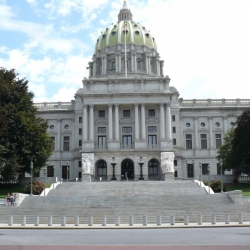
The new tax came after Las Vegas Sands Corp. fought other revenue plans, which were supposed to raise $100 million in taxes from gaming.
Higher taxes on the state’s 12 land-based gaming locations are expected to raise an additional $17 million in revenues for Pennsylvania. The Sands Bethlehem is expected to pay roughly $4.6 million of those new taxes. The tax hike is part of the Pennsylvania’s leaders’ attempts to find new revenue streams for the state’s $31.6 billion budget in 2016-17.
The tax rate is going from 14% to 16% on table games at all casino-style gaming venues in Pennsylvania. The increase came after the state chose not to expand gambling to bars, taverns, and private clubs. For months, that was the preferred means of raising taxes on gambling in the state. The Las Vegas Sands Corp., owner of the Sands Bethlehem, lobbied state lawmakers to keep the gaming expansion from happening.
Sands Bethlehem’s Reaction
It is unknown whether Sands Bethlehem is satisfied with the tradeoff, but the casino and its parent company is likely to prefer to have fewer competitors, even if it means a tax increase. No doubt, any business is not going to be happy with higher taxes, yet LVS knew Pennsylvania has a $100 million shortfall from its proposed gaming tax budget. With that in mind, it was obvious that new revenues had to be raised somehow.
Sands CEO Mark Juliano was not happy with the new tax. Juliano said, “We spent a lot of time fighting some of the other stuff. This one sort of came out of nowhere. We’re not happy about it, but it doesn’t stop us in our tracks. [Pennsylvania] is already the highest tax environment for casinos, but we’ll deal with it.”
Effects of Higher Taxes
Nobody is likely to feel much sympathy for the Las Vegas Sands Corporation. It is the biggest casino corporation in the world, generating billions in revenues from its global enterprise. The Sands Bethlehem is the biggest of Pennsylvania’s twelve legal gaming facilities.
Owners of casinos forced to pay higher taxes say the loss of profits leaders to fewer comps from the business. That includes free meals, free hotel rooms, and cashback from the gaming. The tax increase is only part of the coming changes for Pennsylvania casinos.
New Tax Revenues
The state has to find $100 million in additional revenues from the state’s gaming industry. Taxing the already-existing gaming has diminishing returns at a point, because the casino cuts payroll, stops offering as much gaming, and the overall revenues decline. The state therefore has to find new sources of revenue altogether.
At the moment, the two leading options are expansion of gaming venues or the legalization of online gambling. One proposal would allow Pennsylvania racetracks to build satellite casinos in other parts of the state. The other proposal is to legalize online poker, or perhaps iPoker and online casinos.
Disadvantages of Satellite Casinos
Neither of those options is likely to gain much support from the Las Vegas Sands. Satellite casinos are likely to hurt gaming for the big private casino operators, because they are likely to draw off customers from venues like Sands Bethlehem.
Disadvantages of Online Gambling
Online gambling in any form is anathema to Sheldson Adelson, the CEO of Las Vegas Sands. Adelson has spent the last 2 to 3 years trying to get online gambling banned across the United States. The man who has made more money than any gaming executive in history says online gambling is a particularly bad form of gaming, because problem gamblers can gamble in privacy and because underage gamblers might hack the age verification software.
One wonders if anticipation of the increase is not fueling the investment of $5 million in hybrid electronic table games, which involves the installation of 150 electronic roulette and blackjack games.
